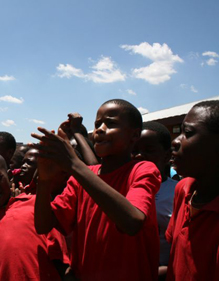
Corruption Watch stats reveal that the biggest culprits in schools are governing bodies and principals, who abuse their positions to personally benefit from school funds and resources. This is according to a preliminary analysis of reports the organisation received from the public between January and December 2012. These findings were recently reported on in the Star and Pretoria News.
Types of corruption reported in schools
About 40% of corruption in schools, according to the public who have reported to Corruption Watch, involves the embezzlement of funds. Principals, governing bodies and school financial officers are the most common perpetrators who channel funds into their own personal bank accounts. These funds may have been allocated for specific projects which do not materialise, or may be funds allocated to the schools by provincial departments. Here is an example of such a report received:
“Over R330 000 allocated to the … primary school for books and maintenance was withdrawn from the school bank account by the principal. The money was not spent for their intended purpose. The principal can't account to the district what the money was spent on. The principal evades the district on the spending of the money. The district also fails to hold the principal accountable. Result is shortage of books, parents have to copy books. Maintenance is affected, blocked toilets and dirty toilets can't be fixed.”
Corruption in procurement processes makes up 16.2% of corruption in schools, according to Corruption Watch’s analysis of its reports. These activities usually involve some form of conflict of interest on the part of staff members at schools, with principals again being the main culprits.
Contracts for school supplies, maintenance work, and building or renovations to school property are given to family and friends of public officials, and it is assumed that the conflict of interest is not declared to the school governing bodies, Corruption Watch’s analysis has found.
Many of the reports show how governing bodies are not holding principals accountable for contracts the school enters into, or that they are unaware that the procurement process is being abused by principals. Here is an example of such a report received:
“At … secondary school in North West, Rustenburg district, Bojanala Area the principal awards any maintenance job at school to close associates at inflated prices and gets kickbacks. For three consecutive years catering for hostel learners worth more than a million rands has not been advertised as it is run by principal's relative and he's given himself a transport tender at 10 thousands rands per month for the past three years to transport Suurplaat hostel learners and there's a security company appointed for more than four years but the school has never had a fence and still the security officers start work at 7.00am until 2.pm, after school hours, weekend and holidays the gate is not manned at all.”
School governing body maladministration accounts for 11.8% of corruption in schools, Corruption Watch’s data shows. The majority of these reports state that school governing bodies are not making financial statements available to parents, either because they do not exist, or because governing bodies refuse to provide this information. People who reported to Corruption Watch further allege that the lack of financial statements is a sign that financial matters of the school are being mismanaged, and that corruption is taking place.
Signs of rot
The lack of basic equipment and education materials are also seen as evidence of corruption, reporters have said. Some reporters also say a lack of skills can be attributed to governing body maladministration. This is why critical posts, such as a treasurer who is able to perform accounting functions, are not being filled. Here is an example of such a report received:
“In schools, if the school governing body (SGB) is non-existent, no SGB meetings, no staff meetings, no SMT meetings, no AGM and no feedback. Educators and parents don't know and have never seen SGB chairperson, SGB treasurer, and other SGB members, have never seen a school financial statement, no accountability, no transparency, secrecy bill is already in place, educators don't know the IDSO, learners have no textbook and the school contravening the Dept. "One learner one textbook policy" and many more regulations, the finances controlled by only 3 people, principal and educator being sole signatories and a financial clerk who is not monitored by anyone, blackmailed … Friends being awarded up to R78 000 computer contract, corruption is imminent and an investigation is warranted.”
Other acts of corruption are taking place at schools include :
- Bribing officials for employment at schools
- Teachers drawing salaries when absent for an extended period of time without explanation
- Teachers engaged in full time remunerative work outside the school – it is assumed that permission has not been sought from relevant authorities
- Theft of food that was intended for use in the nourishment programmes
- Wasteful expenditure in the form of lavish gifts and parties that favour teachers and in particular principals
- Demanding that parents pay fees when the school is registered as a “no fees” school – this is often done under the guise of compulsory “donations” to the school (4.4%)
- Registration of ghost teachers and pupils whereby funds allocated by provincial departments are artificially inflated, and principals are able to pocket the difference
Although Corruption Watch stats show that schools across all provinces are affected, Gauteng and Mpumalanga are particular hotspots of schools graft, according to the reports received from the public.
Do you know about corruption taking place at a school? Help Corruption Watch to expose these violations by being eyes and ears on the ground – and report these cases to the organisation.
You can report your incidents online, by SMSing 45142 (R1 per message), call 011 447 1472 or email info@corruptionwatch.org.za. You can also join the discussions on Facebook and Twitter.

